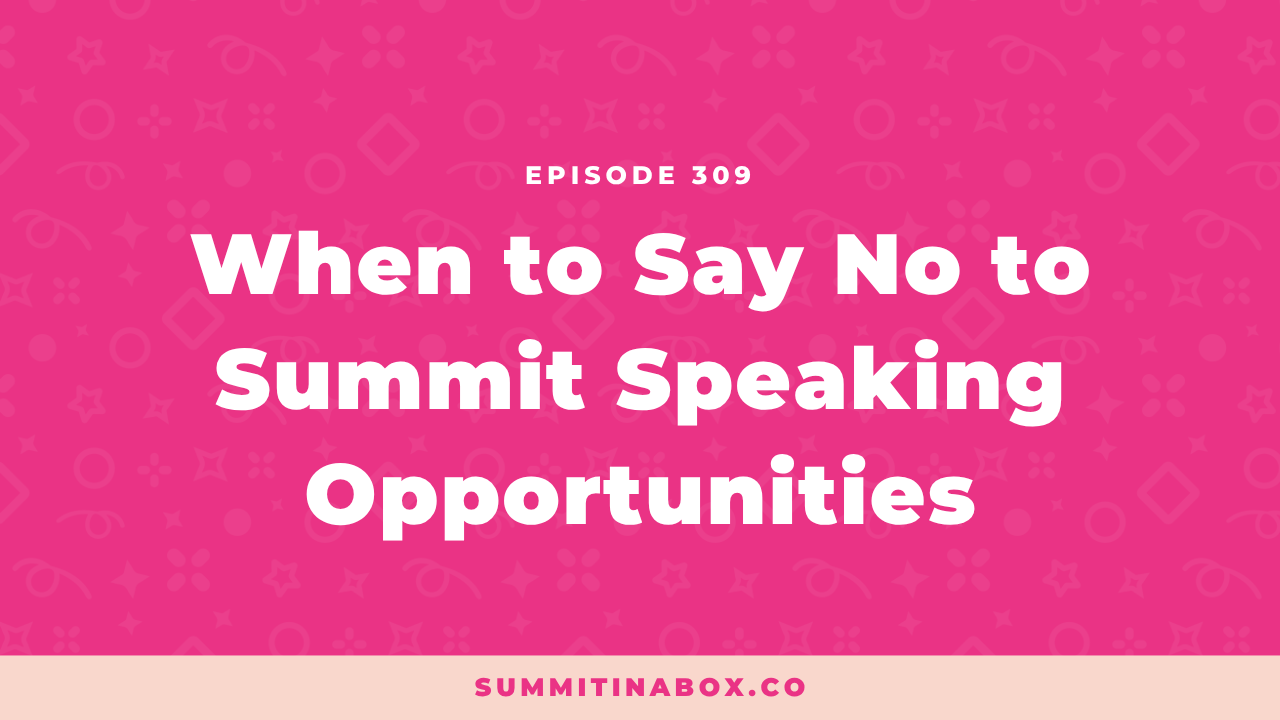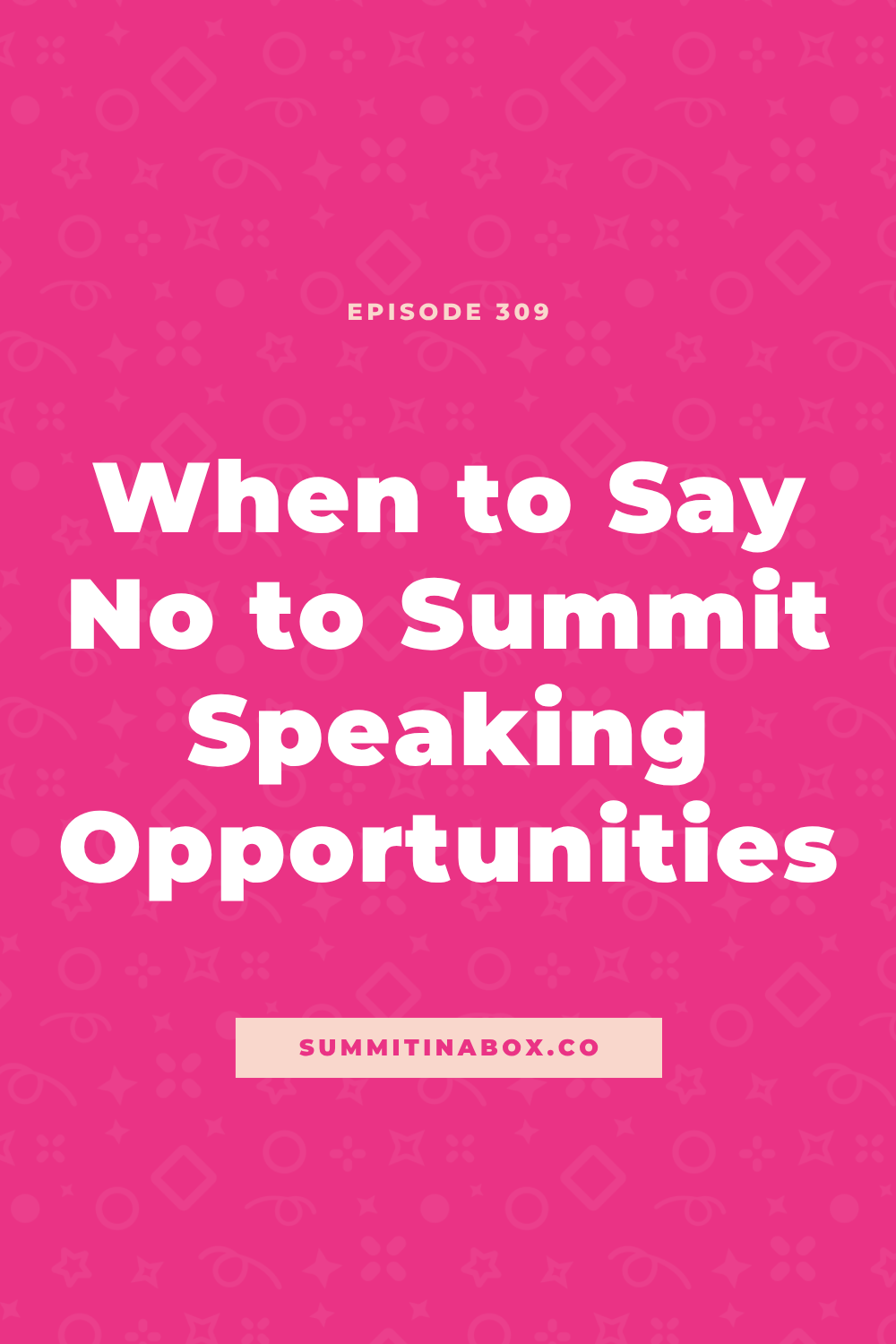When to Say No to Summit Speaking Opportunities


Getting invited to speak at a virtual summit is always exciting. It feels validating for someone to recognize your expertise and want to feature you! But not all speaking opportunities are created equal, and saying yes to the wrong ones can waste your time, drain your energy, and sometimes even damage your reputation.
On the flip side, speaking at the right summits can have an incredible impact on your business! I've spoken at summits that brought in hundreds of qualified subscribers, created valuable long-term relationships, and actually generated revenue for my business. The difference? Knowing which opportunities to say yes to before you commit.
In this episode, I'm sharing the exact framework I use to evaluate every summit speaking invitation I receive. This three-part system has saved me countless hours of frustration and helps me confidently say yes to the right opportunities and no thanks to the ones that won't serve me.
Listen to the episode
Step 1: Evaluate the Opportunity
When you get pitched for a summit speaking opportunity, the first thing you need to do is determine if this summit is actually positioned to help you reach your goals. The main things I look at fall into these four categories:
Audience and Topic Alignment
The most important question to ask is: Will this summit attract my ideal audience? You don't want to get in front of just any audience. You want to reach the people who actually need what you offer.
Look closely at how the summit is being presented. Will you feel good promoting this event to your own audience, or will you wish you didn't have to? Check out their social media presence and web pages. If they don't look professional yet, ask to see the summit registration page before you commit.
Make sure the summit topic clearly aligns with what you do, and that there are no conflicts. Most importantly, confirm that you're being asked to speak about a topic that genuinely excites you and falls within your zone of genius. If the presentation topic doesn't connect to your current offers or business focus, it might not be worth your time.
Timing and Capacity
Take a realistic look at your schedule. When is the host asking for your presentation? Can you comfortably meet that deadline, given your current workload?
Review the promotion requirements carefully. How many emails and social media posts are they asking for? Does that number feel reasonable to you, and does it fit within your promotional calendar?
I often counter-pitch with what I'm actually willing to do. There's nothing wrong with negotiating these terms upfront.
Make sure you have plenty of time to prepare a quality presentation. It's not fair to the host (or yourself) to say yes and then struggle to meet deadlines or have to back out later.
The Host and Event Quality
Do some research on the host if you don't already know them. Look at the email they sent you. Does it appear professional and organized?
Check whether their values align with yours, especially around the big, important issues. You also want to make sure the host clearly values their speakers. This should come through in how they communicate with you.
Evaluate whether the event seems well-planned and legitimate. Does it look like an actual event people will want to attend? Sometimes you'll need to ask questions to get this clarity.
Speaker Benefits
What's in it for you? Make sure you're allowed to share a lead magnet or freebie in your presentation. If they don't allow this, you're not going to grow your email list.
Confirm that promotional requirements are reasonable and doable for your schedule.
Check that you'll receive affiliate commission for any sales you drive, unless those commissions are being donated to a cause you support. This isn't about making tons of money; it's about the host understanding that they couldn't run this summit without their speakers. If you're going to promote, you deserve some commission.
Finally, weigh the benefits against your time investment. Are you getting enough value back for both the presentation creation and the promotion work?
Part 2: Scan for Red Flags
If the opportunity looks solid so far, do a quick scan for warning signs. I look at several angles:
Overall Professionalism
Watch out for vague or unclear requirements, slow or poor communication, hosts who require you to get on a call just to learn about the event, last-minute speaker recruitment (like, they need your presentation in a week or two), missing speaker agreements, or general disorganization in their initial outreach.
If they can't get their act together when pitching speakers, that doesn't say good things about how they'll handle a complex multi-speaker event.
Event Quality Issues
Be cautious of summits with too many speakers. For me, once it gets close to 40 speakers, I really evaluate whether it's worth it. I once participated in a summit with over 100 speakers - that's just not valuable for anyone!
If their target audience or summit topic seems vague or unclear, they're not going to have a successful event. Also, watch for unrealistic timelines or expectations.
Values Misalignment
Make sure their values align with yours. If they treat speakers like they're doing you a favor (instead of recognizing it's mutual), that's a red flag.
Heavy requirements beyond the presentation, like demanding three emails, a worksheet, multiple live appearances, and more, can be excessive. Weigh these against your schedule and the return you're getting.
Trust your gut. If something feels off about their communication style, their social media presence, or the event messaging, listen to that feeling.
Content and Rights Issues
Steer clear if they're demanding exclusive or unlimited rights to your content. The agreement should clearly state how they can use your presentation after the summit ends. You should also be allowed to share a lead magnet in your presentation.
If they're asking you to create content exclusively for their summit that you can't use anywhere else, push back on that. It's not a reasonable request.
Promotional Red Flags
Excessive promotion requirements, like three emails and countless social media posts, are a no. You've worked hard to build your email list. It's great if you want to promote that much, but it shouldn't be required.
Minimum email list size requirements are a huge red flag for me. I won't say yes to a summit with this requirement because it tells me they care more about the size of someone's audience than the value they can bring. It's a list grab, not a value exchange.
If they require promotion in ways that don't align with your style, either negotiate something different or see it as a warning sign.
Financial Red Flags
The final red flag I look for is related to compensation. If they're not offering affiliate commissions or a flat fee payment, it's a no, unless they're donating those proceeds to a good cause.
And if they ask you to pay to speak? Absolutely not. Say no immediately. I have strong feelings about this!
Part 3: Make Your Decision
After going through the evaluation and red flag scan, you'll have a strong gut feeling. Listen to it.
Is it a yes? A heck yes? Or are you unsure?
If you're not sure, make it a no, unless you just need more information about something specific. Don't be afraid to ask for clarification about anything that's making you uneasy.
The red flags are mostly about event quality and how it will feel to participate. The evaluation portion is more about the results you'll get. Both matter.
Why This Framework Matters
I've learned from both hosting summits and speaking at them that the best opportunities are where there's genuine alignment between you, the host, and the audience. When everything lines up, you create high-level value for attendees, build a good relationship with the host, and see actual results in the form of leads and revenue.
But when something is off, everything falls apart. You end up frustrated, attendees don't get what they came for, you don't get results, and everyone loses.
Being selective about summit speaking opportunities isn't about being difficult. It's about being strategic with your time and energy. The right opportunities will move your business forward. The wrong ones will drain resources without giving anything back.
Resources
- Episode 216: Infuse Your Values into Your Virtual Summit
- Episode 304: Why You Should NEVER Pay to Speak at a Summit (and what to look for instead)
- Get the free Summit Speaker Guide!
- Summit Host Hangout® Facebook group
- Launch with a Summit Accelerator®
- 6-Figure Summits Workshop Bundle
Pin it for later!




